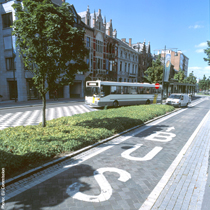Home /
News /
In-depth news /
Urban mobility
next > < previous

Mobility

Urban mobility - 17.03.2008
Consultation on the Green Paper on urban mobility: CEMR calls for better coordination and more support
The Council of European Municipalities and Regions (CEMR) has responded to the European Commission's consultation on the Green Paper on urban mobility "Towards a new culture for urban mobility".
In its response, CEMR shares the EU Commission's opinion to give the EU a stronger role to promote "a new culture for urban mobility" (free-flowing cities, greener cities, smarter and safer urban transport).
This contribution should however not impinge upon the role of local decision-makers who know best the local conditions and needs, and what suits their citizens. CEMR's President, Mayor and Governor of Vienna, Michael Häupl, said: Usually, local governments themselves rather than the EU are in the lead in defining and implementing urban mobility policies. But the EU can support them.
CEMR also calls on to better coordinate policies and actions taken among the local, regional and national levels. National governments and the EU should support and encourage this coordination, in particular by providing flexible and financial support dedicated to urban transport projects. These policies and actions must be coordinated with other policy sectors such as land use, urban planning, transport, economic and social affairs.
CEMR also calls on to better coordinate policies and actions taken among the local, regional and national levels. National governments and the EU should support and encourage this coordination, in particular by providing flexible and financial support dedicated to urban transport projects. These policies and actions must be coordinated with other policy sectors such as land use, urban planning, transport, economic and social affairs.
Promote a new culture for urban mobility
CEMR considers essential to promote both restrictive measures to discourage the use of cars (e.g. creation of green zones, reduction of accessibility to the city centre, etc.) and incentives measures, such as the development of competitive and coordinated alternatives, embracing a diversity of modes (e.g. investment in public transport, car-sharing, car-pooling, walking and cycling).
Road pricing schemes, environmental taxes, taxes on energy, taxes on CO2 and urban congestion charges: these new funding tools can provide additional resources for sustainable transport modes. They can also act as a financial incentive to trigger the shift of consciousness towards an increased use of public transport or clean and energy efficient modes of transport.
A lot of programmes already exist at Eu level to promote sustainable transport modes, including public transport. CEMR however insist on the availability and accessibility of the information on funding opportunities and on results of projects funded.
Background information
The Green Paper "Towards a new culture for urban mobility" aims to launch a further debate on possible options for action. The consultation should identify those actions that will be included in an Action Plan on urban mobility.
The Action Plan, together with its Impact Assessment, will be published in the early autumn of 2008. It will propose actions at the EU, national, regional, and local level and at the level of the industry and citizens.
CEMR response to the consultation is the result of the work of its active working group on transport. It is also based on the "Stuttgart Declaration on urban mobility" adopted by the members of CEMR's Policy Committee.
 shqiptar
shqiptar български
български hrvatski
hrvatski čeština
čeština dansk
dansk Nederlands
Nederlands English
English eesti keel
eesti keel suomi
suomi Français
Français საქართველოს
საქართველოს Deutsch
Deutsch ελληνικά
ελληνικά עברית
עברית íslenska
íslenska italiano
italiano Gaeilge
Gaeilge latviešu valoda
latviešu valoda lietuvių kalba
lietuvių kalba magyar
magyar македонски
македонски Malti
Malti norske
norske polski
polski português
português română
română Serbian
Serbian slovenčina
slovenčina slovenščina
slovenščina español
español Türkçe
Türkçe svenska
svenska український
український












